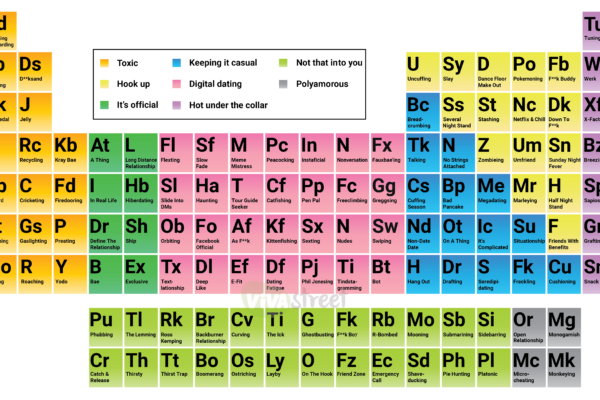You may recognise the word “demisexual”, but do you know what it means?
In this blog, we’re celebrating demisexuality and raising awareness about everything it entails. From what being demisexual means to understanding whether you’re demisexual, we’re covering all the common questions and spotlighting helpful educational resources.
- What does demisexual mean?
- Signs you might be demisexual
- Finding a demisexual community
- How to explore your sexuality
- How to support someone that’s demisexual
- The takeaway
Keep reading to learn more.
What does demisexual mean?
Demisexual is a type of sexual orientation that describes someone who doesn’t feel attracted to others unless they personally know them and have an emotional connection to them.
This is a lesser-known sexual orientation, but it’s not a new concept at all. Demisexuality was coined in the mid-2000s, and thousands of people identify with it today. Being demisexual is all about needing to be familiar and feeling close or safe with someone before engaging in any sexual behaviours.
So, a demisexual isn’t one for spontaneous one-night stands. However, they are open to sexual experiences with those they have a close and personal relationship with.
Do demisexuals have low sex drives?
A common misconception is that demisexuals don’t have sex drives or have very low sex drives. This isn’t true. Demisexuals don’t find the idea of sleeping with someone they don’t know attractive. For a demisexual, attraction is all about knowing someone, feeling comfortable with them, and having an emotional connection.
Technically, demisexuality falls under the asexuality umbrella, but they’re not quite the same. This is because demisexuals do experience sexual attraction, whereas asexuals don’t. Demisexual people are capable of feeling sexual attraction. The key is that it takes time and emotional connection to build.

Signs you might be demisexual
Are you curious about demisexuality? Here are some signs that you might fall under the demi description:
- You don’t experience attraction in the way your peers do. If you don’t relate to people wanting to sleep with those they don’t know or celebrities, it could be a sign that you’re demisexual
- You only experience sexual attraction after you get to know someone. If you only feel a rush of desire once you’re familiar with someone, you might be demi
- Most sexual relationships begin as friends. Similarly to the point above, any relationships you’ve had have likely started as platonic relationships
- You feel pressure on first dates. Demisexuals don’t feel comfortable with first-date sex and are more likely to fixate on deep questions and getting to know the other person.
- You don’t fixate on looks or physique. To you, attraction is related to shared interests and personality rather than abs or breasts
- You’ve been called “picky” or a “prude”. People who aren’t demisexual might call you “picky” because they don’t understand how your attraction works
- You don’t always understand flirting. Perhaps flirting makes you freeze up, or maybe it makes you uncomfortable. Either way, if you think flirting is meaningless or too surface-level, you might need a more profound connection for attraction
- You don’t enjoy pornography. As pornography is very visual and lacks emotions and storylines, it might not do much for you
These are all common indicators of demisexuality. However, ticking these off doesn’t mean you’re demisexual. Only you can decide your sexuality, and it’s completely okay if demisexuality doesn’t feel right for you. Many sexualities overlap and have similar qualities. Take time to research and reflect on your own feelings before choosing a label.
But remember, you don’t have to choose a label either! There’s no wrong or right answer when it comes to sexual orientation and attraction, nor is there any pressure to get things “figured out”.
Finding a demisexual community
Whether you want to chat with like-minded people or learn more about demisexuality, finding a demisexual community is an excellent idea while learning about sexuality.
It’s easiest to find other demisexuals online, and social media is an excellent place to start. TikTok is home to lots of informative videos, and you’ll find other demisexuals providing advice and sharing their life experiences. If you’d rather chat on a forum-based website, the r/demisexuality subReddit is another good resource for connecting with others and asking questions.
Alternatively, you can explore organisations like the Demisexuality Resource Center to find out more about what it means to be demisexual and what to do if you think you might be demisexual. This organisation is owned and operated by a demisexual and focuses on lifting up genuine demisexual voices to ensure they can be heard.
How to explore your sexuality
It can be challenging to know where to start if you’re feeling called to explore your sexuality. It’s critical to note that sexuality is a very personal journey, and there’s no need to do anything that you don’t want to.
However, if you’re finding yourself being drawn to demisexuality, it might be time to reflect on your feelings. You can start exploring your sexuality through the following tips:
- Journaling about your feelings – It can be helpful to get the thoughts out of your head. Many find journaling helps them make sense of their feelings and attraction
- Reading books and articles on the subject – Seek out content from demisexual writers to learn from their experience
- Follow demisexual creators – Social media is a powerful tool, so don’t forget to use it!
- Chat with friends, family, or a professional – Talking to someone else about your feelings can help you discover more about yourself. But only do so if you feel comfortable and safe with them
Learn more about navigating your sexuality here.

How to support someone that’s demisexual
Has someone in your life come out as demisexual? It’s time to show them support and understanding. The best way to be a demisexual ally is by listening to their thoughts and opinions and by accepting their sexual orientation.
However, don’t push them if they’re not ready. You shouldn’t ask invasive or personal questions if they’re not prepared to talk about it just yet. Like with any gender identity or sexual orientation, it’s critical for you to do your own research rather than expecting your loved one to teach you.
If you’re reading this article, you’re already making a start! Read the Demisexuality Resource Center’s ‘For Friends and Family‘ section next to learn more.
The takeaway
Sexuality isn’t always simple, and that’s the beauty of it. Demisexuality is a valid sexual orientation, and it’s time to give the community more support and visibility. Good luck if you’re on a self-reflective journey. Hopefully, this resource will help you learn more about yourself and others.





